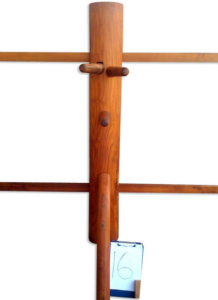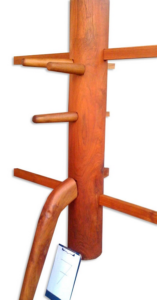The “best” wood for wooden dummies varies from practitioner to practitioner and lineage to lineage. Since Ip Man’s time, Teak has been one of the most popular types of wood for Mook Jong’s. There is no single reason why many practitioners prefer it, but it is without a doubt one of the most beautiful and resilient types of wood you can get your “sticky hands” on. Given teak’s natural oils, it is able with withstand various weather conditions with out splitting like most other wood when humidity changes rapidly.
Why would Wing Chun masters prefer this type of wood back in the day?
Depending on which Wing Chun creation story you subscribe too, many practitioners agree that at some point the art was heavy practiced in the south of China. If you are familiar with this region, you’ll know that the temperature varies GREATLY. If you do some research, you’ll find that it is located in a humid subtropical monsoon climate.
During winter time the temperature can drop as low as 0 ºC (32 ºF) and as high as 38.1ºC (100.58 ºF) in the summer. The humidity isn’t any less forgiving; it can drop as low as 21% and as high as 100%. Any type of wooden products you own will be tortured in this environment. Every time the weather fluctuates, your wooden dummy will also expand and contract.
Before the invention of dehumidifiers, Kung Fu masters needed wooden dummies that are less prone to cracking and are able to withstand extreme weather conditions.
This is why teak wood is so desirable. It is very strong and can withstand extreme temperature and weather conditions. It is also rich in natural oils, making it naturally water resistant and resistant to wood boring insects.
What should you consider before buying a Teak Wooden Dummy?
The demand for this type of wood far exceeds the supply. On top of that, Teak is one of the most expensive woods, and hard to obtain legally due to sanctions.
According to The Independent newspaper:
“Environmentally sound teak is hard to come by. Burma is the only country that still exports teak from natural forests, mostly illegally. Buying anything from Burma provides its brutal military dictatorship with foreign currency. African teak is at risk of becoming endangered.”
All this makes buying Teak wood very tricky and we always recommend buying it from a reliable, eco-friendly, and legal vendor.
Does this mean all recently made Teak Dummies are Illegal?
Absolutely not. All of our products made from Teak sold on Everything Wing Chun are 100% legal.
How does one come across eco-friendly teak wood?
It’s not easy. Often you need to have a “boots on the ground” company to locate a reliable source of this type of wood. Lucky for us we came across a skilled carpenter and a Wing Chun practitioner who enjoyed traveling in Java, Indonesia, coincidentally where some of the best teak wood in the world is located.
All of our teak dummies wood came from reclaimed sources in Indonesia. Such as old houses, boats, and other structures intended to be thrown away. That means most of the wood used is over 100 years old.
How much does Teak Dummies cost?
These dummies are not “starter” or entry level. Most the practitioners who buy them are  serious students of Wing Chun or devoted most of their lives to the art. Depending on the
serious students of Wing Chun or devoted most of their lives to the art. Depending on the
wood source and carpenter, they can range anywhere from $1,999 to $3,000+ USD. It is pretty rare to find a teak dummy under $3,000.
In early 2011 one of our customers asked us to quote a custom teak dummy and found out it would cost well over $3000 JUST FOR THE WOOD. As for a finished product including the carpenter fees, shipping, etc, it would have been well over $4,000 for a custom laminated teak dummy.
Wait, where can you find Teak Dummies that cost less than $3,000?
The only brand we are aware of under $3,000 are the MasterPath line of dummies. Depending on the dummy, their price range is from $1,999 to $2,799, most costing around $2,299
Yeah, but how do they compare to the Buick Yip Teak Dummies?
For those who are new to the world of high end wooden dummies, Buick Yip is a really well known craftsman in the world of Wing Chun. Most would agree that his dummies are among the best available on the market today.
Both Buick Yip Dummies and MasterPath dummies are made using the traditional method with a solid body dummies from a single log. Mid range dummies are usually made from a “9 board laminating process” or a similar method of construction.
Both Buick Yip and MasterPath line of dummies are built by skilled craftsmen who have a strong understanding of Wing Chun. Both lines of dummies are “legit” and all customers have been thrilled by both products.
If you only compare MasterPath dummies and Buick Yip dummies, the main difference is in the price tag. Given scarcity of this type of wood, Buick Yip dummies are set at a higher price point. However, our stock of MasterPath dummies are made from a limited supply of reclaimed teak wood. Given this rare situation, we were able to produce high quality teak dummies at a more affordable price point.
Given the difficulty to obtain this type of wood, Buick Yip Teak dummies are very hard to come by and only make around 2 per year. To date, he has made around 12-15 total. The few we do have in stock are often sold within a few weeks to a month of being listed. If you can’t swing the $3,000+ price tag or simply missed out on his dummies, the MasterPath dummies are a strong alternative. They are very similar in quality and any high level practitioner will be impressed.
Are there any structural differences between the two dummy brands and are they made to traditional measurements?
Both brands of dummies are made according traditional methods and should meet your lineages requirements. However, each dummy will vary slightly and you should review the measurements before making a purchase. It is also worth mentioning that the “traditional standards” varies from Wing Chun lineage to lineage. If you are not certain which one you should buy, you should check with us or your Sifu before placing an order.
The most notable difference the MasterPath dummies and most dummies on the market is the leg
 The MatherPath dummies leg comes down all the way to the ground, in fact, in most cases you will have to trim the end of it to allow it to comfortably fit in your training space.
The MatherPath dummies leg comes down all the way to the ground, in fact, in most cases you will have to trim the end of it to allow it to comfortably fit in your training space.
According to our description at EverythingWingChun.com:
“It is one solid piece of antique Teak Wood, and it runs from the trunk all the way to the ground. It is very strong: approximately 8 cm (3.25 in) in diameter at the top and 6 cm (2.25 in) in diameter at the bottom. Also the leg has a bit of room in the trunk to move around. This makes it great for practicing sweeping techniques. Some consider this leg to be best for perfecting your footwork.”
If you consider it to be too long and still prefer this brand of dummy, you can trim it down to your personal preferences. Just remember that antique wooden dummy legs are hard to come by and we cannot replace it.
Final thoughts
That about wraps up our guide to Teak Wooden Dummies. Buying this type of dummy is not an easy process and there are a lot of factors you have to take into account – namely, the source of the wood. At Everything Wing Chun we do everything in our power to ensure that the wood for all of our dummies are environmentally friendly and we would never consider selling anything that came from a questionable source.
What types of questions would you ask before buying a Teak dummy?

Hi, I would like to buy a solid teak dummy for myself. I am 1.87 meters tall. All you have is sold out. Can you make to order?
Hi Chris,
These were a one-time deal. The only teak dummies we get now are from Buick Yip. And he gets maybe 2-3 a year.
http://www.everythingwingchun.com/Teak-Wood-Dummies-Wing-Chun-dummy-s/282.htm